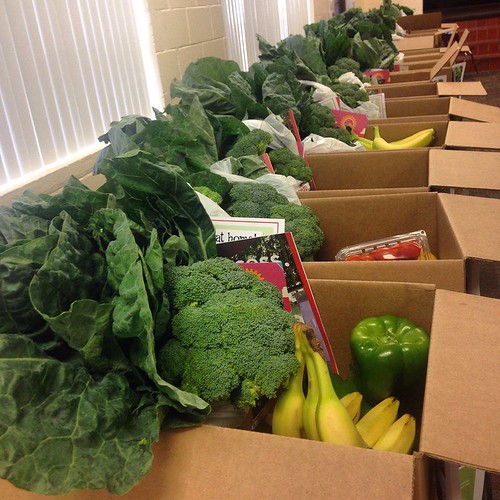
FoodShare boxes sorted and ready for buyers looking to improve their healthy eating choices.
March is National Nutrition Month. Throughout the month, USDA will be highlighting results of our efforts to improve access to safe, healthy food for all Americans and supporting the health of our next generation.
FoodShare Columbia is a program designed to help alleviate the stress families face when they live in “food deserts.” The program, in cooperation with the University of South Carolina and other partners, assembles produce food boxes to distribute to low-income individuals. It just got started in April 2015 and has already distributed more than 3,000 food boxes in a community with a high rate of diabetes-related health conditions. More than half of these food boxes have been purchased by SNAP recipients using their SNAP EBT cards. The program is proving highly successful and is revolutionizing the way the community addresses food insecurity.
By Carrie Draper, MSW, Director of Policy and Partnership Development, University of South Carolina Center for Research in Nutrition and Health Disparities & Beverly Wilson, MPH, Director of FoodShare Columbia, University of South Carolina School of Medicine
One week, a woman brought $20 worth of coins; another week, a man traveled on two bus lines with an empty suitcase. They came to get a box of quality fruits and vegetables from a city parks and recreation community center in Columbia, S.C.
FoodShare Columbia launched in April of 2015 in the zip code of the city with the highest rate of diabetes-related amputees in the country—a statistic partially related to the disparities this area faces in access to healthy foods. Every two weeks, anyone from the community can purchase a Fresh Food Box of produce for either $20 in cash or $10 in SNAP benefits (the program operated by the USDAFood and Nutrition Service formerly known as food stamps). Boxes are $10 for SNAP shoppers because FoodShare Columbia is a SNAP Healthy Bucks site—South Carolina’s state administered SNAP healthy incentives program.
Over the past 11 months, more than 3,000 Fresh Food Boxes have been purchased by community members; over 50 percent of these were purchased with SNAP, with some weeks this percentage exceeding 70 percent. The fruits and vegetables come from a family-owned produce distribution company that is striving to increase their purchasing from South Carolina farmers. The produce is dropped off in bulk from the company on Fresh Food Box pick up days and then sorted into individual household size boxes by volunteers and staff.
Although there are great efforts underway to increase SNAP redemptions at farmers markets around the state, this model has proven particularly successful in this community. Through studies conducted out of the Center for Research in Nutrition and Health Disparities at the University of South Carolina, we identified barriers for SNAP shoppers at farmers markets including location, hours of operation, and lack of variety. We took these into consideration when developing the FoodShare Columbia model. We chose a well-known location within walking distance to a lot of people who receive SNAP that also has a convenient bus stop; recruited numerous satellite locations (e.g., a free medical clinic) around the city and beyond where people can place and pick up their order; developed a system where people can place their orders Monday through Friday from 8 a.m. to 6 p.m. and pick up their boxes from noon to 6 p.m. on pick up days from the main location; and always included at least 10 to 12 varieties of produce in each box. Recipe cards, based on the contents for the week and with upcoming pick up days, are also included.
These strategies are working. Customers often speak of liking and purchasing Fresh Food Boxes because of the freshness, quality, variety, and cost savings:
“It’s like opening up a box at Christmas. I really, really like it…. There’s a variety. And I don’t have to jump to 25 stores to get the sale items and it looks like really good produce. It isn’t like you get it home and the potatoes are rotten or something like that. It’s fresh, decent fruit and vegetables.” – Customer who purchases their boxes with SNAP
Next up for FoodShare Columbia is trying out a produce prescription and referral program, where staff at a public library branch and a medical clinic will screen customers/clients for food insecurity and provide them with a coupon for a free Fresh Food Box. They also hope to work with a group of mothers to create a more culturally-relevant box for Hispanic/Latino community members.
Our program partners include the City of Columbia Parks and Recreation Department, Columbia Housing Authority, Richland Library, and EdVenture Children’s Museum. You can learn more about FoodShare Columbia here: http://nutritioncenter.sph.sc.edu/doc/FoodShareColumbia.pdf.
No comments:
Post a Comment